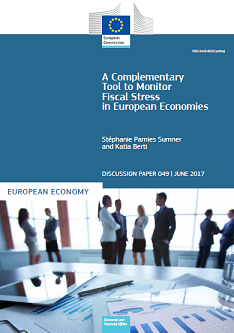Pamies Sumner, Stéphanie, Berti, Katia, (2017), “A Complementary Tool to Monitor Fiscal Stress in European Economies”, European Commission, Directorate-General for Economic and Financial Affairs Discussion Paper No 049, June This paper presents an indicator of fiscal distress for European economies based on a multivariate regression analysis (logit modelling, the L1 indicator) and on a recently updated dataset of fiscal stress episodes. This indicator presents some interesting features: relying on a …Read More
EU – Fateful Year 2017
Vorbach, Judith, (2017), “EU – Fateful Year 2017″, Social Europe, 29 Ιουνίου Economic policy has predominantly been run on neoliberal lines, notably since the 1970s. This trend has manifested itself in the liberalization of markets, cuts in public investment, de-regulation, privatization and marginalization of trade unions. The credo runs: The less government interferes in the market and the more it improves the framework conditions for companies (aka supply side), the …Read More
Do the Troika’s financial assistance programs reduce systemic risk? Evidence from Eurozone countries
Moutsianas, Konstantinos A., Kosmidou, Kyriaki, (2016), “Do the Troika’s financial assistance programs reduce systemic risk? Evidence from Eurozone countries”, International Journal of Banking, Accounting and Finance, 7(2), pp. 149-171 The European sovereign debt crisis has forced many countries in the Eurozone to request financial assistance from the European Central Bank (ECB) and the International Monetary Fund (IMF) to prevent the contagion of the crisis to national banking systems. In the …Read More
How To Get Rid Of Germany’s Excessive Current Account Surplus
Horn, Gustav, (2017), “How To Get Rid Of Germany’s Excessive Current Account Surplus”, Social Europe, 26 June The demand is frequently made that wages in Germany should grow more strongly than up till now. The hope is that this would raise the price of exports and, thereby, foreign demand for German goods would drop. This alone would reduce the surplus in the current account. There would be an even stronger effect …Read More
Unemployment insurance and reservation wages
Le Barbanchon, Thomas, Rathelot, Roland, Roulet, Alexandra, (2017), “Unemployment insurance and reservation wages”, Vox Eu, 27 June Pinpointing the right level of generosity of an unemployment insurance system is a delicate exercise. The main objective of the unemployment system is to provide insurance for workers who lose their jobs. The system should be generous enough to smooth income shocks and allow workers to look for a job when economic conditions …Read More
Understanding The Productivity Puzzle
Davies, Howard, (2017), “Understanding The Productivity Puzzle”, Social Europe, 26 June According to the UK’s Office for National Statistics, output per hour in France was 14% lower in 2015 than it would have been had the previously normal trend growth rate been matched. Output was 9% lower in the United States and 8% lower in Germany, which has remained the top performer among developed economies, albeit only in relative terms. …Read More
Economic Bulletin Issue 4
European Central Bank, (2017), “Economic Bulletin”, Issue 4, June At its monetary policy meeting on 8 June 2017, the Governing Council concluded that a very substantial degree of monetary accommodation is still needed for underlying inflation pressures to build up and support headline inflation in the medium term. The information that has become available since the previous monetary policy meeting in late April confirms a stronger momentum in the euro …Read More
Financial globalisation, monetary policy spillovers and macro-modelling: tales from 1001 shocks
Georgiadis, Georgios, Jančoková, Martina, (2017), “Financial globalisation, monetary policy spillovers and macro-modelling: tales from 1001 shocks”, ECB, June A salient feature of the global economy since the 1990s has been the dramatic rise of financial globalisation. Whether measured by capital flows or indicators reflecting the extent of legal capital account restrictions, economies’ financial markets have been exhibiting an increasing degree of interdependence. As a result, the global economy has become …Read More
Europe’s Banking Union Is Dying in Italy
Giugliano, Ferdinando, (2017), “Europe’s Banking Union Is Dying in Italy”, Bloomberg View, 23 June The Italian government looks set to put Veneto Banca and Banca Popolare di Vicenza, two troubled regional lenders, into liquidation, selling off the good assets to a rival bank for a symbolic price. The toxic assets would be transferred to a bad bank, mostly funded by the government. Shareholders and junior bond-holders would contribute to the …Read More
The EU Macroeconomic Imbalance Procedure: Some impact and no sanctions
Bricongne, Jean-Charles, Turrini, Alessandro, (2017), “The EU Macroeconomic Imbalance Procedure: Some impact and no sanctions”, VoxEU, 22 June Since 2011, EU macroeconomic surveillance has aimed at preventing or correcting the type of imbalances that were responsible for the Global Crisis. Surveillance under the Macroeconomic Imbalance Procedure implies regular reports and policy recommendations monitored by the Commission, and the possible activation of economic sanctions. This column shows that, despite the procedure not having …Read More





